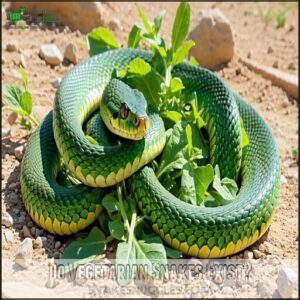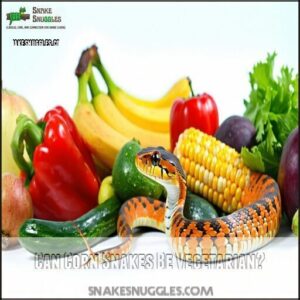This site is supported by our readers. We may earn a commission, at no cost to you, if you purchase through links.
 Snakes can’t be vegetarians—it’s like asking a car to run without fuel.
Snakes can’t be vegetarians—it’s like asking a car to run without fuel.
They’re obligate carnivores, meaning their bodies are built to digest meat, not plants. From their sharp, recurved teeth to their stomach enzymes, everything is designed for hunting and consuming prey.
Essential nutrients like taurine and certain proteins are only found in meat, making a vegetarian diet a nutritional dead end for them. Even species like corn snakes, known for being hardy, would suffer malnutrition, illness, and shortened lifespans without their usual mix of rodents and other prey.
Curious about ethical feeding options? There might be creative solutions ahead.
Table Of Contents
- Key Takeaways
- Do Vegetarian Snakes Exist?
- Carnivorous Nature of Snakes
- Risks of Feeding Snakes a Vegan Diet
- Ethical Considerations for Snakes as Carnivorous Pets
- Best Practices for Keeping Snakes on a Species-Appropriate Diet
- Can Corn Snakes Be Vegetarian?
- Frequently Asked Questions (FAQs)
- What are vegetarian snakes?
- Are there snakes that don’t eat meat?
- Is there a pet snake that doesn’t eat mice?
- Are there any vegetarian reptiles?
- Can corn snakes be vegetarian?
- Are garden snakes vegetarian?
- Are there any vegetarian snakes?
- Are there any snakes that don’t eat meat?
- Which snakes are herbivores?
- Do vegetarian snakes exist?
- Conclusion
Key Takeaways
- Snakes are obligate carnivores and can’t digest plants, so they require animal-based diets to survive.
- Feeding snakes a vegetarian diet leads to malnutrition, severe health issues, and shortened lifespans.
- There are no vegetarian snakes; every species relies on meat for essential nutrients like vitamin D3 and taurine.
- If you’re concerned about ethics, use frozen-thawed prey from humane sources or consider non-predatory pets that thrive on plant-based diets.
Do Vegetarian Snakes Exist?
If you’re wondering about vegetarian snakes, here’s the deal: they simply don’t exist.
All snakes are strict carnivores, meaning their survival depends entirely on animal-based food. Unlike herbivorous reptiles, snakes lack the enzymes needed for plant digestion, so plant-based snakes are a myth.
Even species that eat eggs, like African egg-eating snakes, rely on animal protein. Accidental ingestion of plants may happen, but it’s not intentional or nutritious.
Feeding a plant-based diet has serious ethical implications for their health, so stick to a species-appropriate snake diet. Some snakes, like garter and ribbon snakes, consume worms, amphibians, and small fish.
Carnivorous Nature of Snakes
You’ll notice snakes are obligate carnivores, meaning their bodies are specifically adapted to consume and process animal prey.
Their short digestive tracts and lack of plant-digesting enzymes make a plant-based diet impossible for survival.
Evolutionary Adaptations for Meat-Eating
Snakes are born carnivores, their entire physiology designed for animal protein consumption. Their jaw flexibility is remarkable, allowing them to engulf prey far larger than their heads through stretchable ligaments. Combined with constriction methods or venom delivery, they’re efficient predators.
Born carnivores, snakes are nature’s hunters, equipped with flexible jaws, venom, and constriction for efficient prey capture and consumption.
Their digestive system is finely tuned, boasting intense digestive acidity to break down bones, feathers, and fur. Without this, they couldn’t extract nutrients from whole prey.
Snakes use sensory adaptations like heat-sensing pits to locate warm-blooded victims even in darkness. Sharp, backward-facing teeth help secure struggling prey.
- Their bodies can stretch to swallow giant meals.
- Acidic stomachs extract every nutrient.
- Evolution gave them tools to thrive as carnivores.
It’s nature’s predatory masterpiece!
Essential Nutrients Found in Whole Prey
For a snake, whole prey is like a multivitamin, meal, and muscle booster all rolled into one.
It’s packed with essential nutrients—from protein benefits for muscle repair to calcium sources vital for bone health and even egg production.
Amino acids support organ function, while taurine importance and Vitamin D3 help your slithering friend stay in top form.
Without these macronutrients, vitamins, and minerals, your snake risks malnutrition and severe health problems.
Snakes aren’t built for plant-based diets—they lack enzymes to process plants.
Feeding them whole prey like rodents, insects, or fish mimics nature’s design perfectly.
Think of it as their ultimate meal plan, delivering everything they need to grow, slither, and thrive!
Risks of Feeding Snakes a Vegan Diet
Feeding snakes a vegan diet puts their health at serious risk because they can’t digest or absorb nutrients from plant-based foods.
Feeding a vegan diet to snakes risks malnutrition, organ failure, and shortened lifespans—they’re carnivores by nature, not plant eaters.
Without essential animal-derived nutrients like taurine and vitamin D3, snakes quickly face malnutrition, illness, and even a shortened lifespan.
Malnutrition
Feeding a vegetarian snake diet isn’t just unnatural—it’s dangerous.
Snakes that don’t eat meat face malnutrition, which harms their health and survival. Their bodies are designed to process whole prey, not plants, meaning plant-based diets cause severe nutritional deficiencies.
Here’s how malnutrition manifests in snakes:
- Nutrient Deficiencies: Without taurine, vitamin A, or protein, they suffer immune suppression and growth stunting.
- Digestive Complications: Plant material causes blockages since their systems can’t break down cellulose.
- Starvation and Organ Failure: Lack of proper nutrients leads to muscle wasting and essential organ damage.
- Metabolic Disorders: Deficient diets disrupt body functions, gradually leading to systemic failure.
Stick to proper snake nutrition—whole rodents are life, not lettuce. A key factor is preventing nutritional deficiencies by providing a balanced diet.
Shorter Lifespans
A vegetarian snake diet causes severe nutritional deficiencies, leading to organ failure, weakened immunity, and shorter lifespans.
Without essential nutrients from whole prey, malnutrition triggers weight loss, growth stunting, and reduced fertility.
Over time, poor nutrition accelerates aging, leaving snakes unable to thrive. Their bodies are hardwired for animal-based proteins, not plants.
Premature mortality is common, with most snakes succumbing within months. Simply put, feeding vegetarian snakes will always result in compromised health and inevitable decline.
Illness and Disease
Ever tried running a car on vegetable oil instead of gasoline? Forcing a vegan diet on a snake works just as poorly. Their bodies are precision-designed for meat, and skipping it leads to nutritional deficiencies and cascading health problems.
Here’s the breakdown of risks:
- Metabolic disorders derail energy systems, leaving snakes lethargic or worse.
- Digestive issues crop up as plant matter (which they can’t digest) clogs their intestines.
- Vitamin deficiencies weaken bones, organs, and immune defenses, paving the way for illness.
Without the proteins and fats from animal prey, animals risk organ failure, brittle skeletons, and suppressed immunity. Even a short fasting period is tough on a snake, but forcing plant diets compounds the damage far quicker.
Ultimately, these problems often spiral into disease and shorter lifespans, showing why whole prey diets aren’t optional—they’re life-saving. Feed appropriately, avoid heartbreak.
Ethical Considerations for Snakes as Carnivorous Pets
When keeping carnivorous snakes as pets, you’ll need to grapple with ethical questions about their diet.
Understanding how to source feeder animals responsibly and exploring alternative pet options can help align your practices with personal values.
While meeting your snake’s biological needs can be challenging, it is crucial for their well-being.
Sourcing Ethically-Raised Feeder Animals
Meeting your snake’s dietary needs doesn’t mean overlooking feeder animal welfare.
Seek ethical breeders practicing humane sourcing and responsible farming. Humane rodent farms guarantee feeder animals are raised with proper care and nutrition, meeting prey quality standards.
Explore local breeders for reduced feeder stress or online retailers offering frozen prey sourcing. Farm cooperatives often maintain ethical breeding practices, while reptile shows let you inspect conditions firsthand.
Supporting ethical breeders helps in prioritizing animal welfare. These choices support feeder animal welfare and guarantee your snake receives safe, nutritious food in alignment with ethical considerations.
Cooking Whole Prey Vs Live Feeding
In the context of feeding your snake, balancing safety concerns and ethical considerations is key.
So, should you choose frozenthawed feeding or livefeeding?
Let’s break it down.
Livefeeding introduces significant risks.
Defensive prey animals can injure your snake, sometimes severely, which is why it’s discouraged by reptile experts.
Beyond injury risks, there’s an ethical debate around the stress and suffering it causes the prey.
Cooking whole prey isn’t an ideal solution, either.
While it might seem safer, it leads to nutrient loss.
Essential vitamins, enzymes, and even prey quality degrade during cooking.
Worse, snakes’ digestive systems aren’t designed to process cooked meat, disrupting their ability to digest food properly.
Instead, frozenthawed feeding is a reliable, humane choice.
Thaw frozen feeders in warm water or a refrigerator to preserve nutrients.
This method supports your snake’s biological needs while addressing ethical concerns, ensuring both safety and proper nutrition.
Opting for Non-Predatory Pet Species
If feeding meat to a pet snake doesn’t sit well with you, there are plenty of ethical pet ownership alternatives that thrive on plant-based diets.
These non-predatory pets eliminate the ethical concerns tied to feeding live or frozen prey. From tortoises to guinea pigs, these animals bring joy without conflicting with vegetarian or vegan diets.
Here’s a quick comparison:
| Pet Type | Diet | Care Level |
|---|---|---|
| Tortoises | Plant-based | Moderate |
| Bearded Dragons | Omnivore (70% veg) | Medium |
| Guinea Pigs | Herbivore | Low |
| Rabbits | Herbivore |
Low.
Alternative pet choices like these also promote companion animal welfare and responsible adoption practices. Unlike vegetarian snakes (which don’t exist), these herbivores thrive on vegetables, hay, and leafy greens.
Best Practices for Keeping Snakes on a Species-Appropriate Diet
You need to prioritize a diet that aligns with your snake’s natural feeding habits to guarantee proper health.
By consulting veterinarians, providing enrichment, and maintaining clean enclosures, you’ll support their nutritional needs and overall well-being.
Consulting Veterinarians on Nutrition
Knowing where to turn for expert diet advice is critical when caring for snakes, especially given their unique nutritional needs.
Consulting veterinarians who specialize in reptiles guarantees your pet’s long-term health and avoids common issues like malnutrition and dietary deficiencies.
Veterinarians can assess your snake’s specific needs, offering customized preventative care plans. Key services include identifying nutritional deficiency signs, recommending appropriate prey item selection, and providing supplementation strategies for species-specific diets.
Here’s why snake nutrition benefits from professional guidance:
- Diet evaluation: Confirm your snake gets the full range of nutrients needed for growth and health.
- Feeding schedules: Adjust meals based on activity levels, size, and metabolism.
- Health monitoring: Catch signs of malnutrition early, preventing serious illnesses.
- Species support: Address unique needs for snakes like garter snakes, pythons, or boas.
Regular vet checkups guarantee your snake thrives, even as dietary demands shift with age or growth. Ensuring proper ventilation can prevent respiratory issues.
Providing Enrichment
Providing enrichment for your snake is essential to its well-being and mimics natural behaviors.
Build a habitat rich in diversity with climbing branches, hiding spots, and a mix of textures like rough bark, smooth stones, and varying substrate depths. These elements encourage exploration, resting, and other instinctual behaviors.
Switch up the environment regularly—moving items or introducing new ones prevents boredom and keeps your snake engaged. For mental stimulation, occasionally alter the location of feedings to simulate hunting without compromising their need for prey variety.
Environmental enrichment doesn’t stop at physical items—a well-designed space mirrors the snake’s wild habitat, promoting welfare and boosting mental health. Keep their space engaging, and you’ll foster resilient, natural behavior while ensuring your snake thrives in a species-appropriate, enriching environment.
Sanitizing Terrariums
A clean terrarium is essential for a healthy snake. Regular sanitizing—every 2-3 weeks—prevents mold and harmful bacteria. Use reptile-safe disinfectants, ditching harsh cleaners like those with phenols.
For specialized cleaning, consider a reptile terrarium cleaner. Follow these steps:
- Completely remove substrate and waste during deep cleans.
- Scrub terrarium décor with reptile terrarium cleaners.
- Disinfect water dishes daily to maintain quality.
- Replace substrate entirely instead of spot-cleaning.
Let everything dry thoroughly before reassembling. Maintaining a pristine habitat through proper cleaning frequency keeps your snake safe and thriving!
Can Corn Snakes Be Vegetarian?
Corn snakes, like all snakes, are obligate carnivores and can’t thrive on a vegetarian diet.
Their digestive systems are designed to process meat, not plant matter, making vegetarian snakes impossible. Without animal-based food, they suffer malnutrition, metabolic bone disease, and organ failure.
To keep your pet healthy:
- Offer frozen-thawed rodents sourced from humane suppliers.
- Provide appropriate prey sizes, ensuring a balanced diet.
- Consult exotic veterinarians for guidance on snake nutrition.
For convenient feeding, consider purchasing pre-killed rodent options. Meeting their carnivorous needs is essential for a corn snake’s well-being.
Frequently Asked Questions (FAQs)
What are vegetarian snakes?
All 3,000+ snake species are obligate carnivores, incapable of digesting plants.
Even the tiniest, like Brahminy blind snakes, rely on animal-based diets, such as ant larvae.
No vegetarian snakes exist, scientifically speaking.
Are there snakes that don’t eat meat?
There aren’t any snakes that avoid meat entirely.
Every snake species relies on an all-animal diet, from mice to insects or even eggs.
Their carnivorous biology simply can’t handle or digest plant material.
Is there a pet snake that doesn’t eat mice?
Imagine a menu with no salads—every pet snake eats meat.
For variety, consider African egg-eating snakes.
They skip mice completely, relying only on bird eggs, making them a unique option for non-rodent diets.
Are there any vegetarian reptiles?
You won’t find vegetarian reptiles, as even herbivorous ones, like iguanas or tortoises, rely on plant-based diets but can’t avoid small insects accidentally eaten on foliage.
Strictly plant-eating reptiles just don’t exist by nature.
Can corn snakes be vegetarian?
Let’s not kid ourselves—corn snakes, like all snakes, are obligate carnivores.
Their biology demands animal-based diets, as they lack the enzymes to digest plants.
Feeding them anything else risks serious health problems or starvation.
Are garden snakes vegetarian?
Garden snakes, like all snake species, aren’t vegetarian.
Their diet includes insects, worms, amphibians, and small fish.
Without the ability to digest plants, they rely on animal-based prey to meet their nutritional needs.
Are there any vegetarian snakes?
Nope, snakes can’t go vegetarian.
Every single snake species is an obligate carnivore.
Their bodies evolved to digest only meat, so skipping animal-based meals would leave them malnourished, unhappy, and ultimately unable to survive, which makes them strictly carnivore.
Are there any snakes that don’t eat meat?
All snakes are obligate carnivores, meaning they exclusively need animal-based diets to survive.
Their digestive systems can’t process plant matter, so even the tiniest snake relies on meat, like insects or small mammals, to thrive.
Which snakes are herbivores?
Imagine a lush jungle full of vibrant life, yet there’s no snake nibbling on greens.
Despite diverse diets across species, all snakes are obligate carnivores, solely consuming animal prey to meet their nutritional needs.
Do vegetarian snakes exist?
Vegetarian snakes don’t exist.
Every snake species is an obligate carnivore, meaning their diet must come from animal sources.
They lack the digestive system to process plants, relying instead on meat for essential nutrients.
Conclusion
Expecting vegetarian snakes to thrive is like asking a fish to climb trees—it’s just not in their design.
Snakes are obligate carnivores, relying on meat for survival, as essential nutrients like taurine simply aren’t in plants.
Ignoring their dietary needs leads to malnutrition and health issues.
If ethical feeding concerns you, consider alternatives like pre-killed, ethically-sourced prey.
Ultimately, respecting their carnivorous nature guarantees their health and well-being, and snakes can’t be vegetarians, but they can still thrive under thoughtful care.















